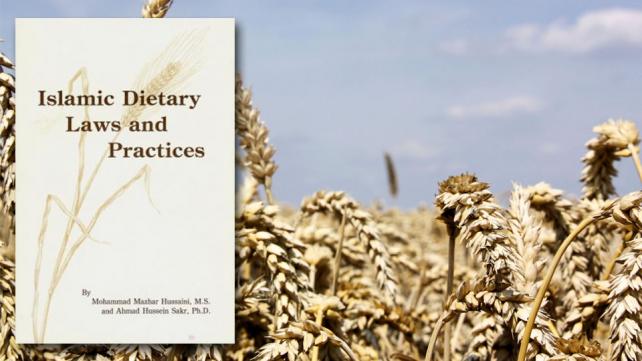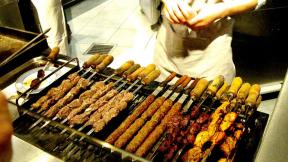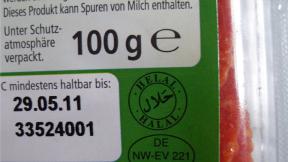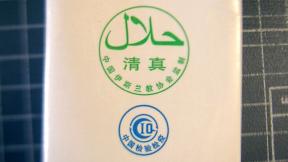
The lists of Halal and Haram food below have been taken with permission from the book 'Islamic Dietary Laws and Practices by Mohammad Mazhar Hussaini and M S Ahmad Hussein Sakr, Ph.D .
It should be noted that a product being imported from a Muslim country is not necessarily a guarantee that it is completely Halal. In fact, food is often imported from abroad into Muslim countries without proper checking of ingredients.
AN ALPHABETICAL DEFINITION GUIDE
An alphabetical list of Halal and Haram ingredients to look out for:
Bacon: A side of pig meat (pork).
Choletsorol: type of fat always of animal origin. If extracted from Zabiha animal, it is Halal.
Diglyceride: Emulsifier. If of animal origin it should be suspected till the source is known.
Gelatin (Jello Gelatin): Usually of animal origin, mostly from pig. If extracted from a dhabiha animal, then it is halal/
Glycerol (Glycerine): It could be of animal, plant or Glyceryl-Stearate synthetic origin. If animal source is used, it is suspected.
Hormones: Usually animal hormones are used for human consumption. One has to find out the source before passing a judgement.
Lard: Fat from swine particulaly found in the abdominal cavity. Totally Haram for us.
Magnesium Stearate (stearic acid): Used as an active ingredient in medicine tablets. Haram when derived from animal source.
Mono Glycerides: When derived from animal source. (Halal when the source is plant).
Pepsin: A digestive enzyme mostly from pig stomach.
Rennin (Rennet): A protein Enzyme. Usually not labeled. (In most cheeses).
Shortening: Fats and oils of animal origin. Animal/Lard
Vanilla: Extracted using alcohol.
Vitamins: Haram when from animal source. Mostly the source is synthetic or plant and are Halal.
Whey: Used in ice creams and yogurt. Haram when from animal source.
A PARTIAL LIST OF HALAL INGREDIENTS
S/N Name of Ingredients Code No Brief Description
Antioxidants: Chemical compounds used to protect certain food components from being destroyed or lost through oxidation.
Ascorbic acid: Vitamin C.
Benzoate (Benzoic acid): Benzoic acid and sodium benzoate are used for food preservation.
Biotin: A member of the B complex vitamins.
BHA: An antioxidant, preservative.
BHT: An antioxidant, preservative.
Citric acid: Sources are plant, usually of the citrus family. (e.g. orange, lime, lemon).
Cobalamine: Synthetically prepared Vitamin B12.
Dextrin: An emulsifying, sizing, and thickening agent.
Fiber: Sources are plant. Provide roughage to diet.
Fructose: Fruit sugar.
Gliadin (Gluten): Ptotein found in wheat and rye.
Hydrogenated oil: Vegetable oil being hydrogenated making it solid at room temperature.
Iodine: A nutrient for thyroid gland.
Lecithin: Emulsifier of fat. In the USA, sources are mainly soyabean and egg yolk.
Lipids : Essential fatty acids found in fish, plant and animals. If source is animal; it is suspected.
Malt: A kind of fermented grain.
Molasses: Syrup liquid obtained in refining sugar.
MSG: Flavoring. Imparts meat flavor to foods.
Niacin: One of the B complex vitamins.
PABA: A food supplement.
Pectin: A gelatinous substance extracted from fruits.
Propionic acid: A preservative.
Riboflavin: One of the B complex vitamins. Usually the source is synthetic.
Pure vegetable shortening: Source of this kind of shortening is plant.
100% vegetable shortening: Source of this kind of shortening is plant.
Sweetener: Substance that gives a sweet taste.
Thiamin: One of the B complex vitamins.
Vanillin: Flavoring agent, extracted from vanilla.
Vitamin A: If source are plant and synthetic, it is halal.
Vitamin C: Natural sources are from plant. (e.g. citrus fruit, tomatoes, etc).
Vitamin D: Natural sources are yeast and fish liver oil. Also synthetically produced.
Vitamin E: Rich sources of Vitamin E are vegetable oils. When source is synthetic, it is halal. If source is animal, it is suspected.
Water: The nutrient most vital to man's existence.
Food yeast: Microscopic, unicellular, fungal plant used for fermentation process and in baking bread.
Photo Attribution: "Weizen2" by Dako99 - Own work. Licensed under Creative Commons Attribution-Share Alike 3.0 via Wikimedia Commons - http://commons.wikimedia.org/wiki/File:Weizen2.jpg#mediaviewer/File:Weizen2.jpg








Comments
List. Of. Hallal. Foods. Listing
Nabisco. Foods. Hallal. Foods. Listing
Location
Seeking answer about fatty acids
Are fatty acids derived from animal sources and hydrogenated forms of such fatty acids considered halal or haram?
Location
Haram or not?
Is corn bran haram?
Location
Is thiamine mononitrate halal
Is thiamine mononitrate halal?
Location
Halal-Haram
Very good works for us. Alhamdulillah and allah bless your team.
Location
I am a Muslim
Thank you very much
Location
I don't like when someone
I don't like when someone insults Islam,Allah,Muhammad etc. We can't say that that this list is not true. This is true. If you don't trust a religion, you don't have a right to insult it. So please don't insult any religion.
insults?
By insult do you mean scrutinize? Islam, just like other religions should be scrutinized, what are you afraid of? If you believe what you believe then all power to you, but what gives you the right to judge me by your religion? Your human same as me, your no better than I am and vice versa.
Location
Jesus Christ
God Bless holy Jesus Christ. Islam never in my name biw down to Allah
Location
is gluten haram?
Some say gluten is halal and some say it as haram. Gluten is a plant source, how can this be haram?
Location
Pages
Add new comment